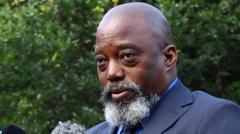Former Democratic Republic of Congo President Joseph Kabila has returned to his home country for the first time in two years, landing in Goma, a city currently held by rebel forces. His arrival has been confirmed by spokespeople from the rebel group M23 and a youth leader from Kabila's party, the People's Party for Reconstruction and Democracy (PPRD).
Kabila’s homecoming follows a move from the Senate to strip him of his immunity as he faces accusations of supporting the M23, which has been clashing with the Congolese military. Previously, Kabila has denied any links to the group, condemning the judicial process as politically manipulated. A significant political figure, Kabila governed DR Congo from 2001 to 2019, succeeding his father Laurent Kabila, who was assassinated.
In an interview with the BBC, Innocent Mirimo, a youth leader from Kabila's party, expressed optimism about Kabila's return, likening it to a father returning to his children. However, the Congolese authorities have warned of serious accusations against Kabila, including claims of war crimes and treason, with officials alleging they possess considerable evidence linking him to the M23's activities.
Additionally, Kabila criticized the Congolese government's democratic integrity in a now-deleted YouTube message, labeling it a "dictatorship" and asserting a "decline of democracy." Government spokesperson Patrick Muyaya swiftly dismissed these assertions, claiming Kabila has "nothing to offer" the nation.
Conflict between the Congolese army and the M23 resumed in 2021 after a peace agreement faltered. The M23 has made significant territorial gains this year, including the capture of Goma, resulting in widespread civilian displacement. Kabila, who spent the last two years in South Africa, mentioned his intention to return at the beginning of the month to assist in resolving the ongoing conflict.
Stay tuned for more updates on DR Congo and the implications of Kabila’s return.
Kabila’s homecoming follows a move from the Senate to strip him of his immunity as he faces accusations of supporting the M23, which has been clashing with the Congolese military. Previously, Kabila has denied any links to the group, condemning the judicial process as politically manipulated. A significant political figure, Kabila governed DR Congo from 2001 to 2019, succeeding his father Laurent Kabila, who was assassinated.
In an interview with the BBC, Innocent Mirimo, a youth leader from Kabila's party, expressed optimism about Kabila's return, likening it to a father returning to his children. However, the Congolese authorities have warned of serious accusations against Kabila, including claims of war crimes and treason, with officials alleging they possess considerable evidence linking him to the M23's activities.
Additionally, Kabila criticized the Congolese government's democratic integrity in a now-deleted YouTube message, labeling it a "dictatorship" and asserting a "decline of democracy." Government spokesperson Patrick Muyaya swiftly dismissed these assertions, claiming Kabila has "nothing to offer" the nation.
Conflict between the Congolese army and the M23 resumed in 2021 after a peace agreement faltered. The M23 has made significant territorial gains this year, including the capture of Goma, resulting in widespread civilian displacement. Kabila, who spent the last two years in South Africa, mentioned his intention to return at the beginning of the month to assist in resolving the ongoing conflict.
Stay tuned for more updates on DR Congo and the implications of Kabila’s return.



















